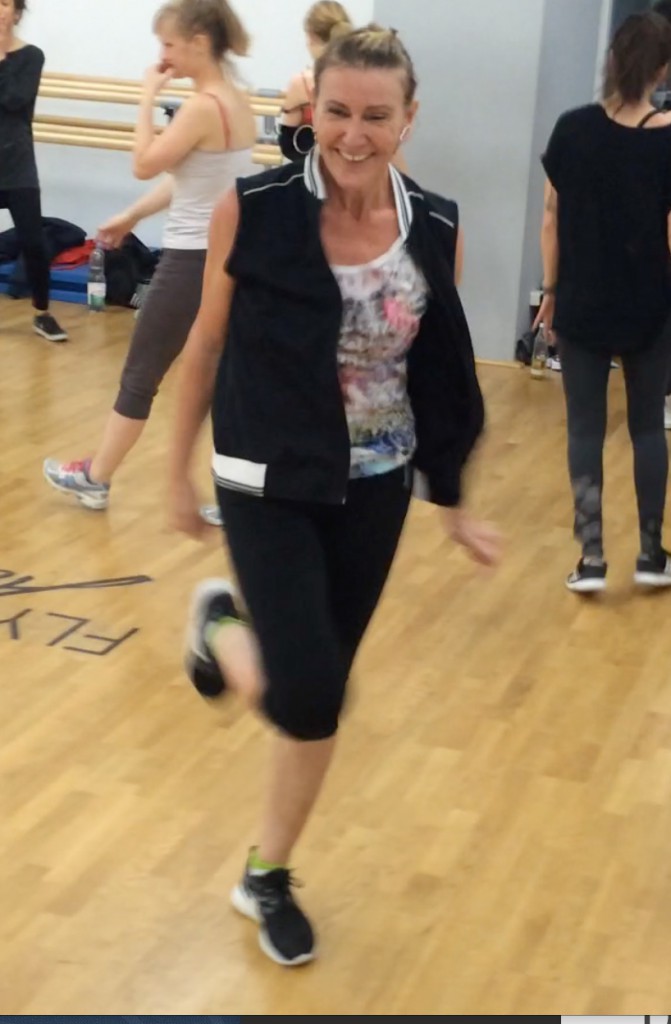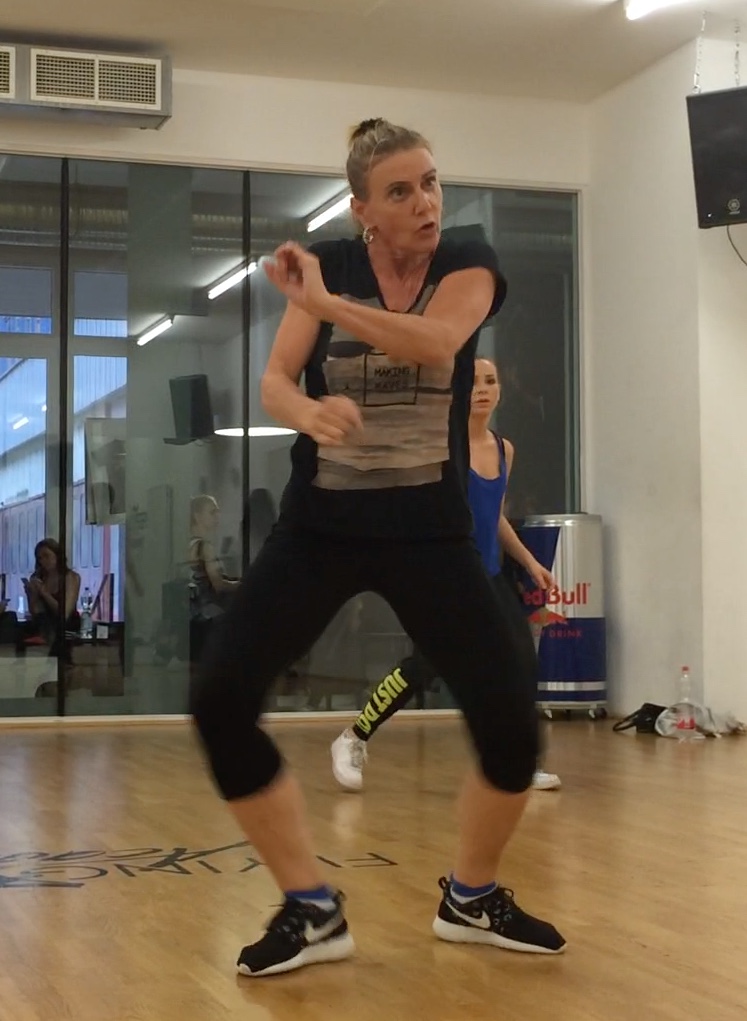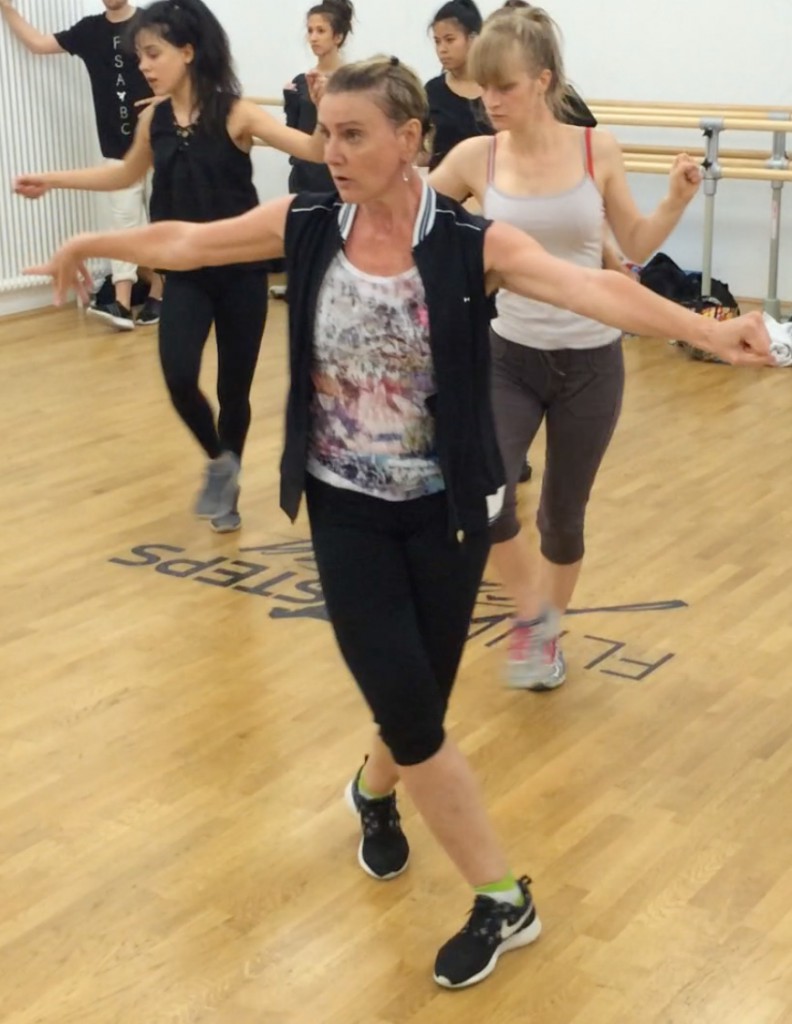Finding Her Dance Swag Later in Life
An Interview with Anouschka Pearlman
BY EMMALY WIEDERHOLT
Anouschka Pearlman is a musician and journalist based out of Berlin, Germany, who took up hip-hop/urban dance in her late 40s. Now 52, she studies dance almost every day. She shares her story of coming to dance at a later age, especially in a form dominated by youth.
~~
How did you get into dance?
I’m a musician by profession, and I have a background in music and theater. I’ve always been interested in fitness, so a couple of years ago I trained as a Zumba instructor. However, as a musician, I didn’t care for Zumba music. I had lived in California many years ago and had taken a hip-hop fitness class at a gym. I kept looking for something like that in Berlin, where I live. I was also working as a music correspondent for NPR at the time, and was always looking for new stories. I’d covered everything on the scene except for hip-hop, so was researching what Berlin had to offer. This is how I came across Flying Steps Academy. It turns out it’s the largest urban dance academy in Europe. I didn’t even know urban dance was a category. I always thought of ballet or modern, but I didn’t know people also took dance classes in new school, old school, LA style, popping, locking, afro, break dance, street jazz, and house… now I do all of that.
I started dancing in 2013, sporadically at first. Toward the end of 2014 I started taking every class I could in Berlin when I was not abroad in Kenya (where I hope to help bring urban dance). Now I train a minimum three hours (two classes) a day, with one day off a week. On the weekends, I dance more. When I go to camps and workshops, I dance eight hours a day. I’m probably the oldest person to ever go to the beat camp I attended in Croatia. I was honored by dancer/choreographer Shaun Evaristo when he said, “Look at this woman! I want to be like her when I’m 60!” I’m not 60, by the way. At another camp here in Germany, one of the teachers was asked: “What inspires you?” He pointed at me and said, “Anouschka inspires me.” These instances make me feel useful.
Was there a specific reason why urban dance attracted you?
I grew up when hip-hop was just starting. I remember living in New York in the late 80s and going to clubs. It was a real vibe. So when I started dancing many years later, I felt at home with the music. I liked its gritty street smarts and protest origins. It resonated with me. But I had no idea there was so much dance structured around the music. I’m struck by how many styles there are within urban dance.
What are your goals coming to dance at a later age?
I’m older, so I’m late in the game, and it’s a very youth-driven industry. This frustrates me. I already know this feeling through being a woman in the music industry. One of my pet peeves is that the arts and entertainment industry, specifically the performance arts, are so narrow. Women are especially dismissed as they get older. While I feel I have so much to learn from younger artists, I truly believe it’s time for a cross-generational approach. I want to be useful and inspire on this subject. I want to say: “You change the industry for your generation. You make sure that, at age 50, you have work!” No one wins from narrow margins, and it doesn’t reflect the human condition. And art is about the human condition.
It takes a journey to perfect a craft. It took me 20 years to get to the point where I can write and perform songs at a world class level. Now I feel like I’m ready, but I’m no longer fresh, and that’s what the industry wants. The same is true for dancers. You gain all this life experience to emote and express, but then you no longer are valued.
That being said, I love the youthful energy in urban dance. I complain about the culture, but I love hanging out with my younger friends and getting the pulse of their reality. It keeps me young. Even if I can’t do all the steps as quickly or catch all the nuances of advanced choreography, I can get the shapes and lines, and I have the swag.
For many dancers who start young and dream of becoming professional, they have a narrow view of success. With this in mind, what do you perceive are some of the benefits of coming to dance at a later age?
I try to tell my young colleagues about the realities of the industry, which I know from music and theater. Having spent my whole life attempting to make it and have a big musical break, I know the kind of competition they’re up against. What I have coming into dance now is a humility you don’t always have when you’re young. I see incredibly talented dancers who always feel like they have to compete with their friends. I know what it’s like to lose and not get the gig, and I know that career is not necessarily the end-all of life. I can enjoy the journey more now than I could when I was younger because I used to be obsessed with becoming successful. I’m still a perfectionist and work hard, but I realize now that all that discipline doesn’t necessarily promise success. I don’t have an end-game plan; it’s really about the journey now. That’s how it should always be, but when we’re younger we forget.
Any other thoughts?
It’s not all great. I have a ton of frustration coming into dance at this age. People look at me and think I’m fearless, but it was a struggle. I watched the advanced class for half a year before I dared go in and take it. There was one advanced class where there were several professionals, and the routine was so fast and nuanced, I became intimidated and talked myself out of ever going back. But when I saw the teacher again, she said, “Anouschka! Why weren’t you in my class last week?” I told her it was too hard, and she told me, “Don’t you dare not come!” Now, two years later, I stand in the front and don’t make a fool of myself. But originally I was afraid the younger dancers would wonder what an older woman was doing in their class. I had no idea people would be so welcoming.
Urban dance is about freedom of expression, openness (tolerance, individuality) and free-style. We can learn from that. I know that my generation is so uptight about many things. Urban dance is a whole value system of authenticity and self-expression. The challenges are to get the lines, musicality, fitness stamina and shapes, and then add your own swag and flavor. And, like music, you are always a student; the process is endless.
~~
Check out Anouschka’s blog, visit www.urbanafter30.com. To learn more about Anouschka’s music, visit www.anouschka.net.



